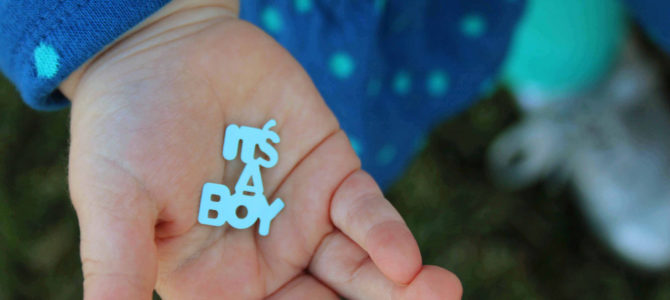
The medical establishment is losing its bearings. Caught in the twilight zone of transgender alt-reality, where hurt feelings matter more than hard science, America’s pediatricians see a new threat on the horizon.
In the November 2017 issue of Pediatrics, Dr. Leena Nahata, a pediatric endocrinologist at the highly ranked Nationwide Children’s Hospital in Columbus, Ohio, sounds the alarm about the “gender reveal” phenomenon. She warns that a sonogram posted to Facebook, or a party to announce the unborn child’s sex, is a hazard to “pediatric health.” So is the traditional delivery room cry of “It’s a girl!” or “It’s a boy!” Why? Because “there are scenarios in which a sex assignment may later be questioned or reversed, leading to a significant amount of distress.”
Nahata isn’t concerned about blurry sonograms that fail to capture anatomical details. She’s also not really talking about infants born with “atypical” genitals, requiring further tests to determine if the baby is a boy or a girl. (She acknowledges that those cases are so “rare” that they occur just once among “4500 to 5500 infants”—i.e., in about 0.02 percent of newborns.) No, Nahata wants parents to embrace a trans-friendly world premised on the idea that “[r]egardless of gender assignment at birth, some kids may later identify as the opposite gender.”
Only Your Baby Can Decide Reality
Note that Nahata sidesteps biological sex—a puzzling move for a doctor—and focuses on gender identity. A peek at a newborn’s genitals, by ultrasound or at birth, merely helps doctors “predict” a child’s future gender identity and “assign” the child a gender, Nahata says.
Although she says that in “the vast majority of cases, an infant predicted to be a boy or girl on prenatal ultrasound will identify that way for life,” she parrots the now-familiar transgender talking point that sometimes the “right” gender assignment is actually wrong. According to transgender lore, only the child can say for sure whether the assigned gender fits (regardless of what those pesky genitals, hormones, chromosomes, and reproductive organs purport to suggest).
The problem is that if the child eventually decides to trade the “assigned gender” for one that seems a better fit, there will likely be pain and awkwardness all around, at least for awhile. However, it clearly troubles Nahata to hear a parent say, “I have to mourn the loss of the daughter I have raised before I can move forward with my son.” Note: she’s not troubled by the unscientific assertion that the daughter turned into a “son,” but by the fact that the parent isn’t celebrating her transgender child’s newly discovered self.
Nahata blames parental distress on “harmful” traditions that celebrate a child’s sex and spur parents to invest in “a particular vision and a set of stereotypes” based on “sex and implied gender.” Already adept at manipulating hormones to sculpt the bodies and mold the minds of her young transgender patients, Nahata now wants to reverse-engineer the emotional distress their parents feel.
Fit Bodies to Feelings, Not Vice Versa?
It’s really a rather remarkable thought process for a doctor. Healthy children who develop confused feelings need their bodies fixed so those confused feelings can be affirmed as normal. And healthy parents who experience natural joy at realizing a profound truth about their child’s human identity (the child’s creation as male or female) need to tamp it down and get some re-education. Parents need to forget what their experiences—and biology—are telling them, and realize that their feelings are the problem.
In Nahata’s perfectly constructed, trans-friendly world, parents apparently would never feel that wrenching sadness when a child repudiates his or her male or female identity. All it takes is for the medical profession to get it right in the first place, says Nahata:
We should educate obstetricians and the delivery room and newborn nursery staff about the implications of overemphasizing the importance of sex of the infant during pregnancy…and after birth. Perhaps, instead of, ‘It’s a boy,’ the first proclamation after delivery should be, ‘Congratulations, you have a beautiful infant!’…Physicians, nurses, and staff in general pediatrics clinics, as well as teachers and staff at schools, should be aware that gender is just 1 [one] aspect of a child’s identity, and not the defining aspect; particular attention should be given to preferred names and pronouns.
Of course, these experts neglect to say exactly how a child goes from being a generic infant to a supposedly self-defining child capable of declaring a “preferred name and pronoun.” Imagine the confusion of a toddler, and later a young child, whose parents never make sense of why he or she has male or female genitals—as if having a penis, for example, were as irrelevant to one’s identity as having freckles.
And imagine the child’s new burden: choosing a gender from the ever-changing LGGBDTTTIQQAAPP menu. Little kids have a hard enough time making meaningless choices about which ice cream flavor to try.
And parents? The doc’s advice is to squelch those normal human feelings—joy at the birth of a son or daughter—and dismantle those normal human expectations. After all, who says an anatomical boy is better off if he actually identifies as a boy? Parents should envision a generic “baby” and take a deep dive into the world of gender-neutral parenting, because Nahata and her colleagues “recommend that all children are raised as gender neutral as possible.”
Want some better advice? Find a new pediatrician.









